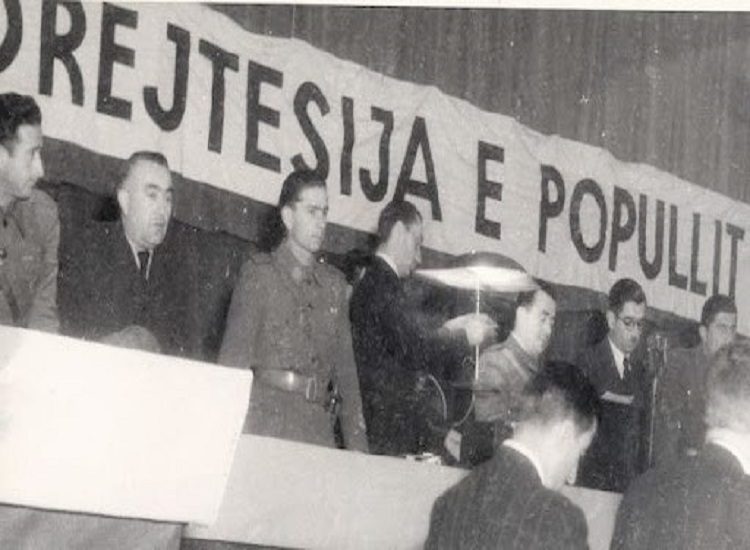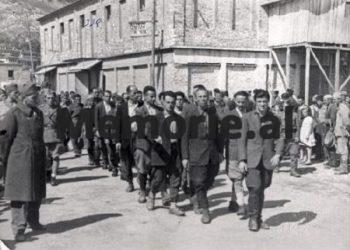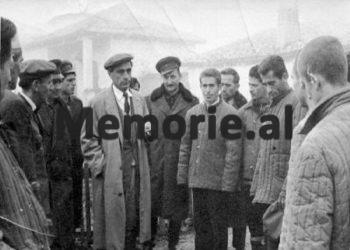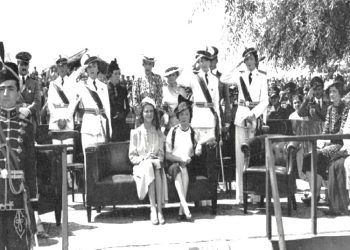Dashnor Kaloçi
Part forty
Memorie.al publishes a voluminous archival file issued by the institution of the Authority for Information of Former State Security Files, where there are hundreds of documents with the logo “Top secret” belonging to the former political prisoner, Xhavit Qesja, originally from the city of Kruja, whose family during the period of occupation of the country, 1939-1944, was closely associated with the Anti-Fascist Movement, being one of its main bases and made available all the wealth it had, as Xhavit was one of the first members of the Albanian Communist Party for the Kruja district, leading the Kruja-Ishëm partisan battalion and the 22nd Assault Brigade. Xhavit Qese’s political career after the end of the War, where he was appointed and served in senior positions in the Albanian Army, the apparatus of the Central Committee of the ALP, and several districts of the country, from where he was sent to study in the Soviet Union, where stayed until 1957, when he was announced to return to Albania urgently, after openly expressing his views in favor of the political line being pursued by the main Kremlin leader, Nikita Khrushchev, condemning the Stalin cult. Enver Hoxha’s conversation with Xhavit Qesen in his office in the Central Committee, where he sharply criticized him for the wrong views he had expressed during his studies in Moscow, urging him to reflect and make self-criticism, but Xhavit rejected the suggestion of the first secretary of the Albanian Labor Party, which caused him to no longer be allowed to go to the Soviet Union to complete his studies, but to be sent to work as deputy chairman of the Elbasan Executive Committee, from where a year later, he was expelled from the Party and exiled to Zvërnec Island, where the communist regime kept isolated some of the former senior party and state cadres whom he had condemned for their anti-party views. Xhavit Qesva’s long ordeal and persecution from 1957 to 1990, where he spent a full 32 years in prison and internment, being one of the few Burrel prison convicts to go on long hunger strikes in protest of the treatment and savage attitude that the communist regime of Enver Hoxha was holding towards him. The complete form, investigative and judicial file in charge of Xhavit Qeses, which is published for the first time by Memorie.al, which contains the documents of the former State Security that reflect the prosecution and wiretapping against him, the reports of Security collaborators with pseudonyms their correspondence with the letters he sent to the highest party and state instances, as well as the highest leaders of the ALP, until 1991 when he was released from prison!
Continued from the previous issue
Indictment against the defendant Xhavit Qesja formulated by the General Prosecutor, Shuaip Panariti, sent for trial to the Supreme Court of the People’s Republic of Albania on October 23, 1967
THE PEOPLE’S REPUBLIC OF ALBANIA
MINISTRY OF JUSTICE
Supreme Court
Year 1967 No.Regj.Them.194
No. Decision 183
Date of arrival, 11/10/1967
Date 23/10/1967
Defendants
Xhavit Hajdar Qesja
Charges
For agitation and propaganda provided as a crime by article 73 / I K.P.
Judge of the case:
THE PEOPLE’S REPUBLIC OF ALBANIA
GENERAL PROSECUTOR’S OFFICE
Tirana on 11. X. 1967
Dega Kont. Act. inquiry
No. 0185 Prot.
HIGH COURT
Criminal College
Tirana
Pursuant to Article 28 point 1 of the Code of Criminal Procedure, we are sending you for trial the case of the defendant Xhavit Qesja.
Attorney General
Dhori Panariti
APPROVED
ACT – ACCUSATION
Against the defendant:
Xhavit Hajdar Qesja, who is accused of having committed the crime provided by Article 73/1 of the Criminal Code of R.P. of Albania,.
On September 11, 1967, the State Security authorities arrested the defendant Xhavit Qesja, for having carried out for a long time hostile activities against R.P. of Albania.
Defendant Xhavit Qesja, being an element with available anti-party prey, with the coming into force of the Khrushchevite revisionist clique in the Soviet Union, took an anti-party position and at first in disguised forms and later in open forms, carried out anti-party activities. -party against the line of our party and in favor of modern revision.
Although the Party made every possible effort to correct him, this defendant being hostile and determined in his revisionist path, conscientiously continued his hostile activity.
That this defendant has been in anti-party positions against our party line and in favor of modern revision. Although the Party made every possible effort to correct him, this defendant being an enemy and consciously placed in his revisionist path continued his hostile activity.
That this defendant has been in the anti-party position for many years before and consciously emerges, among other things, from these words that he writes in the letter dated May 20, 1966: “I do not deviate a single millimeter from my thoughts, I did not think of such a thing when for many people many things were not clear, because I had very clear things for myself. “That and this remains my conviction.”
After the Party was convinced that the defendant Xhavit Qesja was an enemy and consistent in his anti-party and revisionist activity, he expelled him from its ranks and took the necessary measures so that this enemy of the class would not have the opportunity in his hostile activity, to harm no matter how little interest of the people, the party and the Homeland.
But even after these measures, the defendant Xhavit Qesja consistently continued his hostile path and tried by all means to fight our Party, to fight and discredit the dictatorship of the proletariat in our country. In order to achieve this goal, the defendant Xhavit leaves nothing unsaid against the party and the government, against the leadership of the Party and our State.
This defendant in many of his letters where directly and indirectly speaks with the greatest hatred against the dictatorship of the working class in our country. To swear and slander as much as possible against the power of the party he uses all those words with which the classics of Marxism-Leninism and progressive writers have condemned the wildest, most oppressive and barbaric regimes that have existed in all times of oppressive systems and exploitative.
In addition, the defendant Xhavit, like all Titoist and Khrushchevite revisionists, defended the counter-revolution in Hungary and the counter-revolutionary events in Poland, causing the dictatorship of the proletariat at that time in those countries.
With this, the defendant seeks to make analogies and condemn the dictatorship of the proletariat in our country, because it takes harsh measures against the enemies. To concretize this we are mentioning these words that the defendant wrote in the letter dated 21 December 1966.
“Then I was in Moscow, then the Second Congress took place, the events took place in Hungary and Poland. Great events here! Ordinary Soviet people, exactly those who had given blood and sweat, inquired about the condition and still trembled when they saw the closed van scattering bread among the shops, because it reminded them of the mortuary van of the organs of the Internal Affairs for years came to make arrests. Then there in Moscow I heard from the Hungarians themselves that the events in Hungary were caused by Rakoshi, because in his time even breathing was not free.
As for the events in Poland, can you say what you want but you cannot think that they were “pure”, “crystal clear”…! I will be grateful for these three events for life, because they woke me up from the lethargy of naivety and made me think! “These events have led many to draw conclusions and I have drawn and as a result I broke away from you, and for this I feel very calm and happy.”
So does not this statement alone show that the defendant Xhavit Qesja has fought and is fighting furiously against the dictatorship of the proletariat in general and against the dictatorship of the proletariat in our country in particular. The enemies of socialism are they revisionists or capitalists, with these arguments, and in this regard that the defendant Xhavit also fought, have fought and are still fighting the power of the working class and the Marxist-Leninist parties.
Defendant Xhavit calls it happiness that he was able to break away from the Labor Party, from the dictatorship of the working class, and that he was thrown into the camp of revisionism and imperialism. “I ‘, says the defendant Xhavit, in his letters I am in open opposition to your line. “I am your political opponent and I like to speak to you in this language.”
That the defendant is a political and ideological opponent of our party and popular power, that this defendant has that ideology and follows the policy pursued by the revisionists, that the defendant hereby demands that in our country be established the policy that does not defend the interests of the working class, but the interests of the enemies of the class, whether they be revisionists or capitalists.
So that the defendant is such an enemy that is why we have brought him here to judge, the working class trial. From what we described above, as well as from the other issues that this defendant wrote in his letters, it is clear that here we are not dealing with convictions as the defendant wants to present, here we are dealing with a deeply hostile activity which the defendant has displayed in the clearest and most brutal forms.
Here, too, we are not dealing with some issues, as the defendant has stated several times, he has shown it in the most open and brutal forms. Here, too, we are not dealing with some issues as the defendant sometimes states, but here we are dealing with diametrically opposed worldviews that deny each other.
The defendant rises up against the dictatorship of the working class and demands freedom for the enemies; we work to strengthen the dictatorship of the working class, to strengthen popular power in the fierce struggle against external and internal enemies. The mask that the defendant wants to wear to his revisionist and counter-revolutionary activities has long been torn.
So, by whatever name I call myself defendant Xhavit, for our people and party, this has been and remains a dangerous enemy, who, like his masters, the Titoist revisionists and Khrushchev, cannot throw himself at the Party and the people ours. The mask of our enemies has been torn from our enemies forever.
The hostile activity of the defendant Xhavit Qesja is proven by a number of letters that this defendant has written and that are in his file.
Regarding the above, the defendant Xhavit Hajdar Qesja, dated born 1920, born in Kruja and in recent years interned in Zvërnec of Vlora, with higher education by profession, unpunished expelled from the party, divorced, has 2 children, comes from wealthy backgrounds, arrested on 11 September 1967.
It is accused that:
Has carried out hostile activities against the power of the Party in the form of agitation and propaganda.
Considering the full conduct of the investigation into the case and the evidence gathered sufficient to proceed to trial, guided by section 204 of the P.P. I decided to send the investigative case of the defendant Xhavit Qesja, through the Prosecution, to the Court for trial.
Investigator
Stavri Xhara
On 11 / x / 1967 the defendant Xhevit Qesja, after reading and being served with the indictment, refuses to sign the receipt
Attorney General Investigator
Asaf Kondi Koço Josifi
The decision for the defendant Xhavit Qesja, compiled by the judge of the case, Hilmi Telegrafi, at the High Court of the People’s Republic of Albania
THE PEOPLE’S REPUBLIC OF ALBANIA
SUPREME COURT
No.194 Act… Tirana, dated 20/9/1967
DIRECTORATE OF INTERNAL AFFAIRS
(By the Police)
TIRANA
On 23/1/1967 at 15 o’clock in the afternoon, to accompany the prisoner Xhavit Hajdar Qesja to the High Court, for trial
Please respect the date and time specified above.
JUDGE OF THE CASE
(Hilmi Telegraph)
DECISION
In Tirana, today, on 12/10/1967, I, Hilmi Telegrafi, a member of the High Court, after reviewing as the sole judge the acts of the case by the General Prosecution to be tried for the crime provided by article 75 / I of KP
I realized
That the investigations of the case are sufficient and that the accusation and the legal qualification of the offense correspond to the materials of the case, but these reasons and in support of articles 213 and 216 of K.Pr.P.
Decided:
- Sending the defendant Xhavit Hajdar Qesja to court to be tried for the crime provided by article 73/1 of K.P.
- The case was examined at 3 pm on 23/10/1967 in a closed court session with the participation of the prosecutor.
- Summon witnesses
- The security measure should not be changed
To inform the bodies of Internal Affairs about the escort of the defendant on the day and time of the trial. Memorie.al
Tirana on 23/10/1967
JUDGE OF THE CASE
Hilmi Telegraph
The next issue follows











